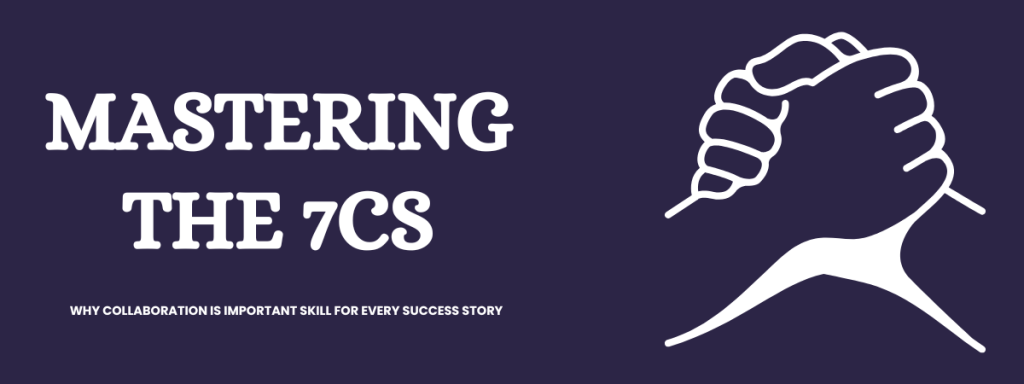When examining success stories, we often celebrate and discuss the landmarks of an individual, overlooking the fact that no achievement is possible in isolation. Behind every breakthrough lies a web of relationships, partnerships, and shared efforts. That’s why collaboration stands out and becomes one of the essential skills of the 21st century. In his book The 7C’s: 21st Century Skills That Transform, Michael Hugh Harvey identifies seven essential skills. The second “C” in the set of seven essential skills is often cited as a key to personal and professional transformation, a force that can truly transform your life and work.
Critical Thinking comes first because it sharpens judgment and decision-making. However, right after you have made those challenging decisions in life is the time when you need collaboration. Without collaboration, even the best ideas often remain unrealized. With it, teams unlock synergy, innovation, and long-term impact.

Why Collaboration Matters:
Often, we are overwhelmed by our struggles and consider them part of the efforts that yield success. The experts suggest that no one in this world achieves those chords of success all alone. It takes a whole unit to work hard, stay connected, and reach those milestones altogether.
What makes it the most challenging skill to achieve is understanding its importance. Collaboration is not something that needs to be served as a dessert at your table; instead, it should be given the importance of a main course that must be included in the basic skills of an individual. Here is why it has now become a necessity in modern times.
Synergy Creates Bigger Wins
Collaboration multiplies strengths. When people with diverse skills, experiences, and perspectives come together, the results often surpass what they could have achieved individually. The combined intelligence, creativity, and problem-solving power of a team lead to breakthroughs and innovations.
Diversity Fuels Innovation
Teams that include people with varied backgrounds and viewpoints tend to generate more creative solutions. Differences spark discussion, challenge assumptions, and open the door to new ideas that a single perspective might never uncover.
Shared Responsibility Increases Productivity
Collaboration enables responsibilities to be distributed, allowing for faster movement and greater accomplishment. Instead of carrying the burden alone, team members support each other and hold each other accountable, creating efficiency and momentum.
Stronger Connections Build Resilience
Working together doesn’t just get the job done—it strengthens bonds. Collaboration builds trust and relationships, which provide support during challenges and setbacks. Success becomes a collective achievement, not a solitary pursuit.
Collaboration in Action:
Taking a look around some of the most successful business we understand the importance of collaboration and how effective and impactful it could turn out to be in the long run
Dr. Harvey emphasizes that collaboration is not just a workplace skill rather it’s a life skill. Communities thrive when people unite around shared goals. From local volunteer groups to global movements, collaboration strengthens bonds and makes large-scale change possible.
One of the biggest examples of collaboration comes when NASA’s Mars Rover missions succeeded because of collaboration across disciplines. Engineers, scientists, and programmers pooled knowledge to solve problems that no single expert could have managed alone.
How to Build Strong Collaboration Skills:
When collaboration becomes one of the most essential and practical skills for success, each of us must recognize that it is a skill that can be developed over time with the right intentions and mindset.
Here are four ways to strengthen this essential skill:
- Listen actively: Genuine collaboration starts with understanding others. Practice listening to truly grasp the ideas being shared.
- Respect differences: Disagreements can be productive when approached with openness. Value diverse opinions instead of resisting them.
- Celebrate collective wins: Acknowledge contributions and share credit. Collaboration thrives in environments where success is viewed as a group effort, where each individual’s contribution is recognized and valued.
- Stay adaptable: Be willing to adjust your approach when new insights or perspectives emerge. Flexibility makes collaboration smoother and more effective.
The Role of Collaboration in Success:
The fact that collaboration stood second on the hierarchy of 7Cs” highlights its role as the bridge between ideas and action. Critical thinking equips us to analyze and make decisions, but collaboration ensures that those decisions translate into meaningful outcomes. It’s the force that turns potential into achievement, empowering us to bring our best ideas to life.
Think about the biggest success stories you know—whether in business, science, or social impact. Behind each of them, you’ll find not just a brilliant idea but also a group of people who worked together to make it possible.

Conclusion:
Mastering collaboration is not just about working with others, it’s about creating the collective momentum that drives success. As The 7C’s: 21st Century Skills That Transform by Michael Hugh Harvey emphasizes, collaboration is the bridge that turns ideas into action, making sure that even the best plans are carried out with the support and efforts of a unified team.
Collaboration doesn’t mean losing your individuality; instead, it’s about bringing your strengths to the table, valuing the contributions of others, and creating something greater than what one person could achieve alone. Whether in business, education, relationships, or community work, collaboration is the cornerstone of progress. It enables us to go further together than we could on our own, transforming our vision into meaningful impact.